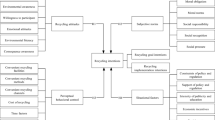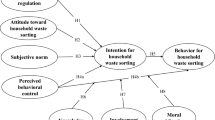Abstract
To effectively solve environmental pollution and resource waste problems caused by the rapid growth of express packaging waste, government intervention is needed in the separation and recycling of household waste at the source. Considering the correlation between behavior and individual psychological preference and concerns, this study administered a questionnaire survey (N = 847) and used factor analysis, hierarchical regression, and sensitivity analysis to evaluate the responses and determine the influence of individual focus tendency and empowerment perception on waste recycling behavior. The results showed that individuals with a high prevention focus or a high promotion focus were more likely to have good waste recycling behaviors. Furthermore, the higher the psychological perception of waste recycling empowerment (reflected in the meaning, competence, choice, and impact), the more inclined an individual to participate in recycling and waste reduction activities. In terms of interaction effect, psychological empowerment perception and its dimensions can positively moderate the effect of promotion focus on waste recycling behaviors. In other words, psychological empowerment perception acts as an “amplifier,” and its dimension of meaning was the most important moderating variable. The study results supported policy suggestions to promote individuals’ active participation in waste source separation and recycling activities.




Similar content being viewed by others
References
Antonopoulos IS, Karagiannidis A, Tsatsarelis T, Perkoulidis G (2013) Applying waste management scenarios in the Peloponnese region in Greece: a critical analysis in the frame of life cycle assessment. Environ Sci Pollut Res 20(4):2499–2511
Avnet T, Higgins ET (2006) How regulatory fit affects value in consumer choices and opinions. J Mark Res 43(1):1–10
Avolio BJ, Zhu W, Koh W, Bhatia P (2004) Transformational leadership and organizational commitment: mediating role of psychological empowerment and moderating role of structural distance. J Organ Behav 25(8):951–968
Baas M, De Dreu CK, Nijstad BA (2008) A meta-analysis of 25 years of mood-creativity research: hedonic tone, activation, or regulatory focus? Psychol Bull 134(6):779–806
Beatty SE, Kahle LR, Homer P (1988) The involvement-commitment model: theory and implications. J Bus Res 16(2):149–167
Budisantoso T, Bhati A, Bradshaw A, Tang CM (2016) Hedonic shopping motivation: does it really matter? Springer, Singapore, pp 51–64
Chen F, Chen H, Huang X, Long R, Lu H, Yue T (2017a) Public response to the regulation policy of urban household waste: evidence from a survey of Jiangsu province in China. Sustainability 9(6):1034
Chen H, Chen F, Huang X, Long R, Li W (2017b) Are individuals’ environmental behavior always consistent?—an analysis based on spatial difference. Resour Conserv Recycl 125:25–36
Chen F, Chen H, Guo D, Long R (2017c) Analysis of undesired environmental behavior among Chinese undergraduates. J Clean Prod 162:1239–1251
Chen F, Chen H, Long R (2017d) Undesired environmental behavior and its presentation—the impact to regulatory focus. J Beijing Inst Technol (Social Sciences Edition) 19(5):28–36
Conger JA, Kanungo RN (1988) The empowerment process: integrating theory and practice. Acad Manag Rev 13(3):471–482
Crowe E, Higgins ET (1997) Regulatory focus and strategic inclinations: promotion and prevention in decision-making. Organ Behav Hum Decis Processes 69(2):117–132
Duan H, Li J, Liu G (2017) Developing countries: growing threat of urban waste dumps. Nature 546(7660):599
Flick U (2009) An introduction to qualitative research. Gastroenterol Nurs 25(1):10
Ginsburg L, Berta W, Baumbusch J, Dass AR, Laporte A, Reid RC et al (2016) Measuring work engagement, psychological empowerment, and organizational citizenship behavior among health care aides. Gerontologist 56(2):1–11
Hamstra MRW, Kai S, Yperen NWV, Wisse B (2014) Followers feel valued—when leaders’ regulatory focus makes leaders exhibit behavior that fits followers' regulatory focus. J Exp Soc Psychol 51:34–40
Higgins ET (1997) Beyond pleasure and pain. Am Psychol 52:1280–1300
Higgins ET (1998) Promotion and prevention: regulatory focus as a motivational principle. Adv Exp Soc Psychol 30(2):1–46
Higgins ET (2000) Making a good decision: value from fit. Am Psychol 55(11):1217–1230
Higgins ET, Friedman RS, Harlow RE, Idson LC, Ayduk ON, Taylor A (2010) Achievement orientations from subjective histories of success: promotion pride versus prevention pride. Eur J Soc Psychol 31(1):3–23
Humborstad SIW, Dysvik A (2016) Organizational tenure and mastery-avoidance goals: the moderating role of psychological empowerment. Int J Hum Resour Manag 27(12):1237–1251
Janssen O (2005) The joint impact of perceived influence and supervisor supportiveness on employee innovative behaviour. J Occup Organ Psychol 78(4):573–579
Kammerlander N, Burger D, Fust A, Fueglistaller U (2015) Exploration and exploitation in established small and medium-sized enterprises: the effect of CEOs' regulatory focus. J Bus Ventur 30(4):582–602
Kark R, Van Dijk D (2007) Motivation to lead, motivation to follow: the role of the self-regulatory focus in leadership processes. Acad Manag Rev 32(2):500–528
Koob GF (1996) Hedonic valence, dopamine and motivation. Mol Psychiatry 1(3):186–189
Laschinger HKS, Finegan JE, Shamian J, Wilk P (2004) A longitudinal analysis of the impact of workplace empowerment on work satisfaction. J Organ Behav 25(4):527–545
Mühle S, Balsam I, Cheeseman CR (2010) Comparison of carbon emissions associated with municipal solid waste management in Germany and the UK. Resour Conserv Recycl 54(11):793–801
Nordlund AM, Garvill J (2002) Value structures behind pro-environmental behavior. Environ Behav 34(6):740–756
Pardo T, Martínez-Fernández D, Clemente R, Walker D, Bernal MP (2014) The use of olive-mill waste compost to promote the plant vegetation cover in a trace-element-contaminated soil. Environ Sci Pollut Res 21(2):1029–1038
Peterson NA (2004) Beyond the individual: toward a nomological network of organizational empowerment. Am J Community Psychol 34(1/2):129–145
Poortinga W, Steg L, Vlek C (2004) Values, environmental concern, and environmental behavior: a study into household energy use. Environ Behav 36(1):70–93
Singh M, Sarkar A (2012) The relationship between psychological empowerment and innovative behavior: a dimensional analysis with job involvement as mediator. J Pers Psychol 11(3):127–137
Song Q, Wang Z, Li J (2013) Environmental performance of municipal solid waste strategies based on LCA method: a case study of Macau. J Clean Prod 57(20):92–100
Speer PW, Peterson NA (2000) Psychometric properties of an empowerment scale: testing cognitive, emotional, and behavioral domains. Soc Work Res 24(2):109–118
Spreitzer GM (1995) Psychological empowerment in the workplace: dimensions, measurement, and validation. Acad Manag J 38(5):1442–1465
Spreitzer GM, Kizilos MA, Nason SW (1997) A dimensional analysis of the relationship between psychological empowerment and effectiveness, satisfaction, and strain. J Manag 23(5):679–714
Spreitzer GM, Janasz SCD, Quinn RE (1999) Empowered to lead: the role of psychological empowerment in leadership. J Organ Behav 20(4):511–526
State Post Bureau of the People’s Republic of China (2017) 2016 postal industry development statistics bulletin. http://www.spb.gov.cn/xw/dtxx_15079/201705/t20170503_1150869.html. Accessed 12 Jan 2019
Sun L, Fujii M, Tasaki T, Dong H, Ohnishi S (2018a) Improving waste to energy rate by promoting an integrated municipal solid-waste management system. Resour Conserv Recycl 136:289–296
Sun L, Li Z, Fujii M, Yasuaki H, Tsuyoshi F (2018b) Carbon footprint assessment for the waste management sector: a comparative analysis of China and Japan. Frontiers in Energy 12(3):400–410
Thomas KW, Velthouse BA (1990) Cognitive elements of empowerment: an “interpretive” model of intrinsic task motivation. Acad Manag Rev 15(4):666–681
Wan T (2009) Trust and organizational citizenship behavior: empirical research on the moderating effect of psychological empowerment. Nankai Bus Rev 12(3):59–66
Wen Z, Hau KT, Marsh HW (2004) Structural equation model testing: cutoff criteria for goodness of fit indices and chi-square test. Acta Psychol Sin 36(2):186–194
Wu ZM, Wu X (2007) Transformational leadership and organizational citizenship behavior: mediating role of psychological empowerment. J Manage Sci China 10(5):40–47
Yao Q, Yue GA (2009) New development in the domain of motivation: regulatory focus theory. Adv Psychol Sci 17(6):1264–1273
Yim YC, Yoo SC, Sauer PL, Seo JH (2014) Hedonic shopping motivation and co-shopper influence on utilitarian grocery shopping in superstores. J Acad Mark Sci 42(5):528–544
Funding
This work was financially supported by the Fundamental Research Funds for the Central Universities (2017XKZD12), the Social Science Fund of Jiangsu Province (18GLB015), Project funded by China Postdoctoral Science Foundation (2018 M640539), Jiangsu Philosophy and Social Sciences Excellent Innovation Cultivation Team (2017ZSTD031), the Think Tank of Green Safety Management and Policy Science (2018 “Double First-Class” Initiative Project for Cultural Evolution and Creation of CUMT 2018WHCC03), and the Scientific Research Project of Jiangsu Normal University (18XWRX018).
Author information
Authors and Affiliations
Corresponding authors
Additional information
Responsible editor: Philippe Garrigues
Publisher’s note
Springer Nature remains neutral with regard to jurisdictional claims in published maps and institutional affiliations.
Feiyu Chen and Hong Chen are co-first authors.
Electronic supplementary material
ESM1
(DOCX 35 kb)
Rights and permissions
About this article
Cite this article
Chen, F., Chen, H., Yang, J. et al. Impact of regulatory focus on express packaging waste recycling behavior: moderating role of psychological empowerment perception. Environ Sci Pollut Res 26, 8862–8874 (2019). https://doi.org/10.1007/s11356-019-04416-7
Received:
Accepted:
Published:
Issue Date:
DOI: https://doi.org/10.1007/s11356-019-04416-7




